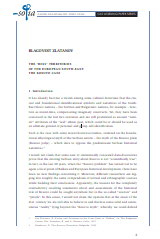The Balkans as Homeland? Versions of the Territorial Identity of Bulgarians under Ottoman Rule
The Balkans as Homeland? Versions of the Territorial Identity of Bulgarians under Ottoman Rule
Author(s): Dessislava Lilova
Subject(s): Cultural history, Ethnohistory, The Ottoman Empire
Published by: Centre for Advanced Study Sofia (CAS)
Summary/Abstract: The purpose of this essay is to investigate the meaning of “homeland” for Bulgarians under Ottoman rule. The formation of a collective territorial identity can be traced to the period between the late 18th century to 1878 and the creation of a sovereign Bulgarian state. The transition from pre-modernity to modernity is marked by the gradual emergence of an educated elite, a network of schools, and a Bulgarian-language press. The system of mass education is a classical mechanism for homogenizing communities at the supra-local level, and the formation of the Bulgarian nation is no exception to this rule. In other respects, however, the development of Bulgaria’s system of mass education had several peculiarities, and this is what makes it interesting to study. First, the educational system developed free of bureaucratic supervision. It was controlled neither by the Church nor by the state, and it comprised schools maintained and governed by local village and town parishes. Second, the people employed in this system studied at lyceums and universities in different foreign countries and introduced elements from the respective country’s educational standards in Bulgarian schools. None of these countries however controlled the transfer of textbooks and programs.
- Page Count: 17
- Publication Year: 2007
- Language: English
- Content File-PDF

